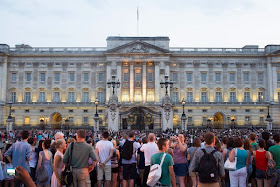 |
| The Duchess of Cambridge |
The baby, a boy who weighed in at 8 pounds, 6
ounces, will not be king for some time: he has to wait in the long line behind
his great-grandmother Queen Elizabeth; his grandfather Prince Charles; and his
father, Prince William. Nor are British monarchs as important in the wider
scheme of things as they were in, say, the 16th century.
But the birth of the as-yet-unnamed (at least as far
as we know) royal son of William and his wife, the Duchess of Cambridge, gave
Britain a chance to celebrate itself by connecting its past to its present,
something it is especially good at.
It also gave the wider world a chance to demonstrate
once again that there is something about royal occasions that can apparently
turn republicans into monarchists, however briefly, even in countries that
renounced their own monarchies long ago.
Failing that, it gave people here something to focus
on that did not have to do with the bad political situation, the bad economy or
the bad weather.
Like a bride wearing something old and something
new, Buckingham Palace announced the birth in a way that reflected both
traditional pomp and modern circumstance. Yes, a piece of paper signed by the
royal doctors and announcing that Kate “was safely delivered” of a boy was
driven from the hospital to Buckingham Palace, where it was solemnly placed on
an ornate, gold-trimmed easel to impress tourists.
But the palace first announced the birth the modern
way, via a news release that meant the information flashed around the world
before the piece of paper even made it into the car. The palace did not explain
why it had reneged on its plan to make both statements simultaneously, but one
possibility is that it wanted to forestall potential tabloid efforts to follow
the car in a dangerous fashion while trying to photograph the contents of the
paper.
Following ancient custom, political leaders in
Britain hastened to join the happy bandwagon by expressing their pleasure.
Prime Minister David Cameron announced on Twitter that he was “delighted” and
that Kate and William would be “wonderful parents.”
Deputy Prime Minister Nick Clegg said that “this is
wonderful news that will make the whole country smile.” And across the
Atlantic, President Obama referred to the “special relationship” enjoyed by
Britain and the United States — always a way to warm British hearts — and
declared that he and his wife, Michelle, wished William and Kate “all the
happiness and blessings parenthood brings.”
Members of the royal family said they, too, were
thrilled, led by Prince William, who said, “We could not be happier.”
The story began Monday morning when people woke up
to the news that the Duchess of Cambridge, formerly known as Kate Middleton,
was in the early stages of labor and that she had been admitted to St. Mary’s
Hospital in Paddington, where Prince William was born 31 years ago.
For most of the day, that was all the news there
was. Hundreds of people gathered at the hospital to find out what was going on,
but nothing was going on, at least as far as anyone told them. No one emerged
to reveal whether Kate had an epidural, for instance, or whether she swore at
William when he told her how to breathe — these are the Windsors, not the
Kardashians — and the crowd had to wait in ignorance.
It was the hottest day in seven years. Téba Diatta,
a British-Senegalese Kate-and-William fan wrapped in a long, homemade Union
Jack skirt, had made a cake to commemorate the occasion, but by the afternoon
the icing had cracked and the writing had become partly illegible. “It used to
say, ‘Come on Kate, we can’t wait, give us something to celebrate,’ ” Ms.
Diatta said sadly.
Meanwhile, another equally in-the-dark crowd had
gathered at Buckingham Palace, many people pressed right up against the gates,
as if they were prisoners trying to break out of their non-royal lives. Some
were Britons who had come especially for the occasion; some were tourists who
claimed they just happened to be there; others for some reason turned up in
elaborate costumes.
Some couples seemed to be in slight discord over the
cosmic importance of the event.
“We’re going to wait here until the baby’s born,”
announced Denise Cave, a 49-year-old Canadian.
“We are?” said her husband, Wayne, 51, who did not
share his wife’s unalloyed excitement. He thought of an alternative plan,
whereby Ms. Cave could remain where she was to wait out the labor, while he went
to “grab a beer and watch it on TV.”
The news was released to huge cheers, and then an
air of anticlimax. The reporters who had obsessively speculated for days about
when the baby would be born enjoyed a moment of emotional satisfaction, and
then switched to their next obsessive speculation: what the baby will be named.
The BBC reported that it took Prince William’s
parents, Prince Charles and Diana, Princess of Wales, a week to name their
firstborn son, so who knows when this next bit of news will come. The palace
said it would happen “in due course.”
As night fell at the palace, the crowds realized
that nothing else was going to happen — Queen Elizabeth, for instance, was not
going to ruin generations of tradition and suddenly come out to answer their
questions — and began to dissipate. They said it had been an arduous
experience.
“It was like going through labor,” said Michael
Frederick, who works in public relations, speaking of the wait, and the heat,
and the crowds, and the excitement, and finally of Kate. “I hope she realizes
what I have been through.”
 |
| Father and Son |
Report was contributed by John F. Burns, Alan
Cowell, Stephen Castle, Julia Werdigier and Katrin Bennhold for The New York
Times





No comments:
Post a Comment
What Do You Think?